Will Germans embrace or shun refugees?
- Published
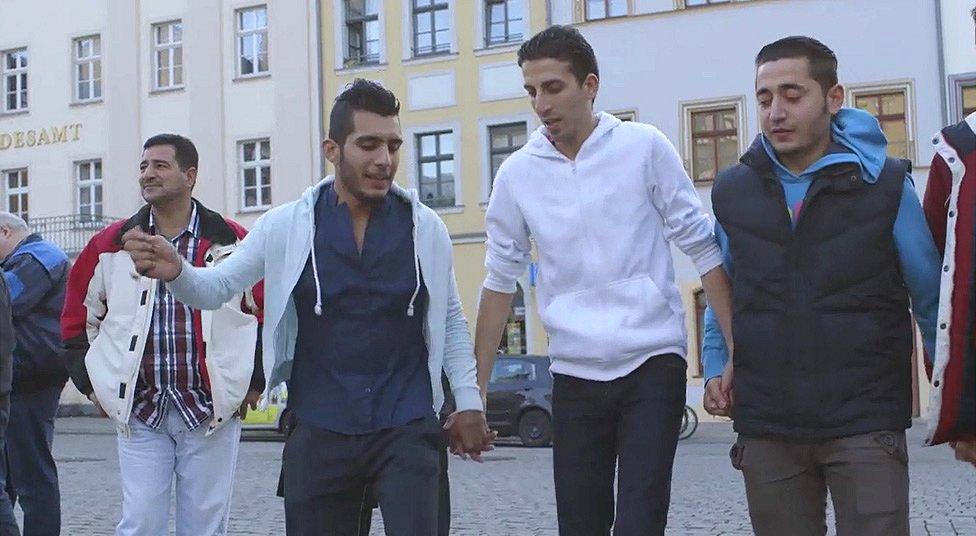
Tens of thousands of Syrian refugees are being dispersed throughout Germany. One family in the east of the country describe how their small city is adapting to life alongside the country's new residents.
In a crowded market square in Gera, poets and performers take to the stage. Above them is a banner that has become a familiar sight at train stations across Germany. "Refugees Welcome," it reads in big letters.
Die Linke, a left-wing German political party, has set up a stall to welcome the newcomers, alongside a local charity.
A growing crowd of refugees and supportive locals dance around the square to a blasting soundtrack.
Nearby, supporters of AfD - Alternative for Germany - a right-wing group which is cynical about the entry of so many refugees, have gathered.
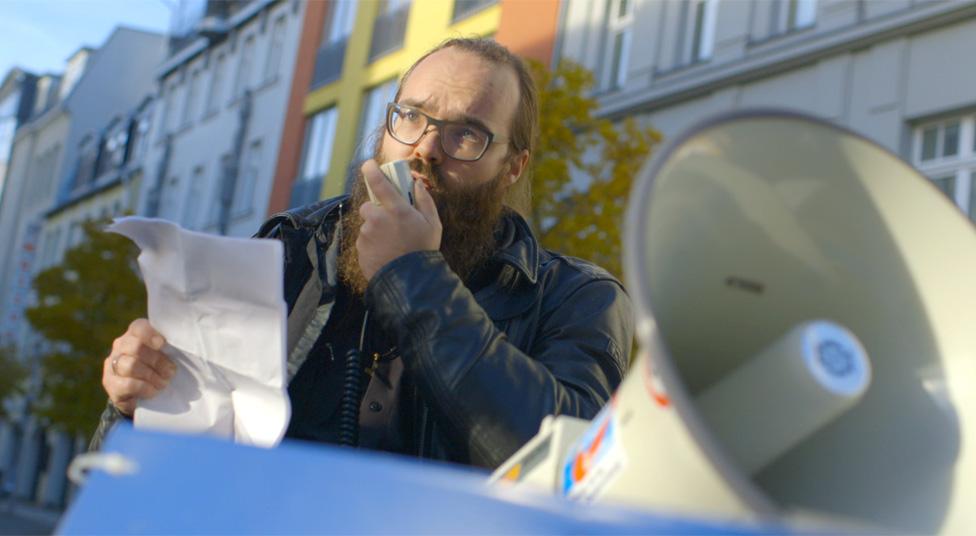
The AfD party opposes the arrival of so many refugees
It's Saturday afternoon in late October and Dirk Heinze has come with his wife Daniella Bruhnke and their three children, Sophia, six, Turina, two, and 10-month-old Pierre to hear what both groups have to say.
Dirk, 40, works in care for the elderly and has lived his whole life in Gera. I'm following them as well as some of the refugees to see how they and the city adapt to the changes brought about by the influx of asylum seekers.
Gera was once part of the former German Democratic Republic. It is small, with a population of 95,000, and, until recently, only had 2,000 foreign residents.
Dirk views the groups with scepticism, saying that they are both trying to capitalise on the refugee crisis.
Dirk and Daniella explain that they are frustrated at being excluded from decisions that have affected their town. Many residents feel the same, according to Daniella, because the decision to admit so many refugees was made by politicians, without consultation.

Find out more
Catrin Nye's Our World report Welcome to Germany can be seen on the BBC News Channel and BBC World News (click for transmission times). Readers in the UK can watch it after 04:30 GMT on Saturday on the BBC iPlayer.

The couple haven't been involved in any protests, although they understand why others have. "So many other people are coming. They [the protesters] fear for their jobs. They fear, well, yes for their lives," says Daniella.
In August Angela Merkel said all Syrians could apply for asylum, and wouldn't be sent back to the first safe country they landed in. Germany was already taking a substantial number of refugees.
This week it was reported that the influx of asylum-seekers in Germany has reached the one million mark - four times the total for 2014. About a half of the new refugees are from Syria.
Refugees are being bussed across the country. How many each of Germany's 16 states receives is based on its wealth.
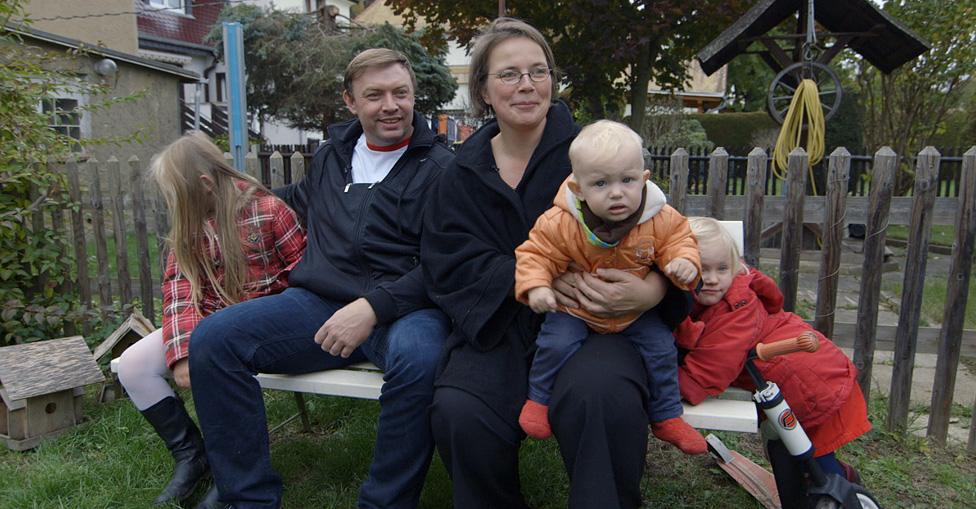
Dirk and Daniella are keen to learn about the refugee situation
Gera is receiving fewer refugees than other cities. Many of them are currently living in the former hospital, converted in mid-October into a refugee centre for up to 2,000 new arrivals.
Someone tried to flood the centre before it opened, so security is very tight. There was also an attack on a refugee by two German men with five dogs in tow. Injuries were minor but news quickly spread around the centre that it may not be safe to go out at night.
The recent influx has caused a mini-political earthquake in Germany. Merkel's approval rating slipped to 54% in December - down from 71% in January.
There have been high-profile and large Pegida (Patriotic Europeans Against the Islamisation of the West) demonstrations against the arrival of Muslim refugees. These have mostly been held in Dresden - about an hour from Gera.
In Gera itself there have been smaller protests known as "Thugida" demonstrations (the name combines Pegida with Thuringia, which is the state in which Gera sits).
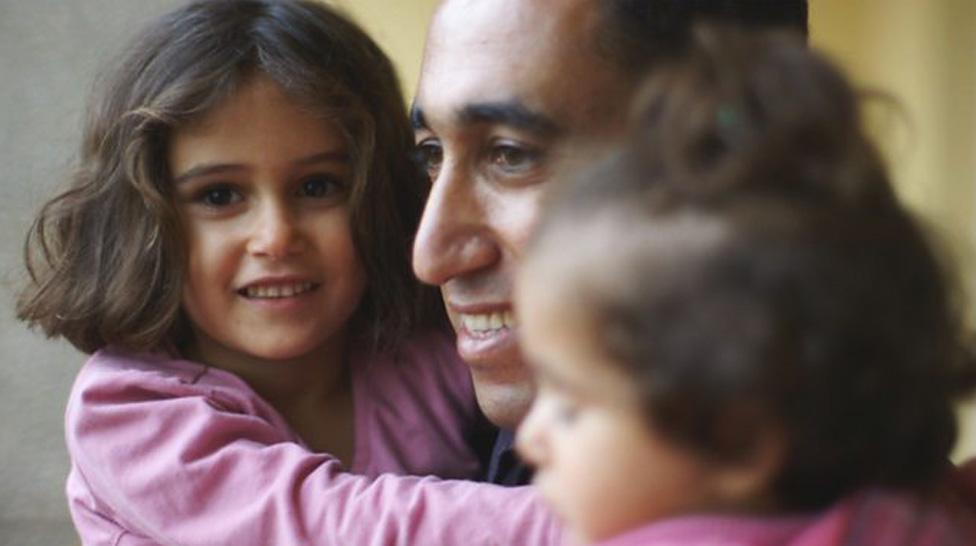
Daham al-Mohamed arrived in Gera recently from Syria
It's far from one-sided, though. Germans have been filling train stations to welcome refugees - handing out sweets to children and clothes to their parents.
Dirk and Daniella's concerns are always couched with sympathy for those truly in need. "Regardless of which country they come, what religion they are - if someone needs help, they have to receive help," says Daniella.
But she maintains that people shouldn't be allowed to come "just because they want a better life, and because it is better here in Germany".
Dirk is sceptical of Merkel's "Wir schaffen das" pronouncements. The phrase, which means "We will make it", has spawned numerous YouTube mash-ups and memes, some featuring Bob the Builder.
Dirk thinks Germany is taking in so many refugees because of the dark history of the country, "to show to the world that the people here are so-called good people".
In the market square, a man is handing out the Koran. He talks to Dirk about Islam, trying to counter some of the negative things Dirk has heard. He is assured the religion is not aggressive, and that IS does not represent Muslims.
The Syrians I speak to say it's vital that this message is understood.
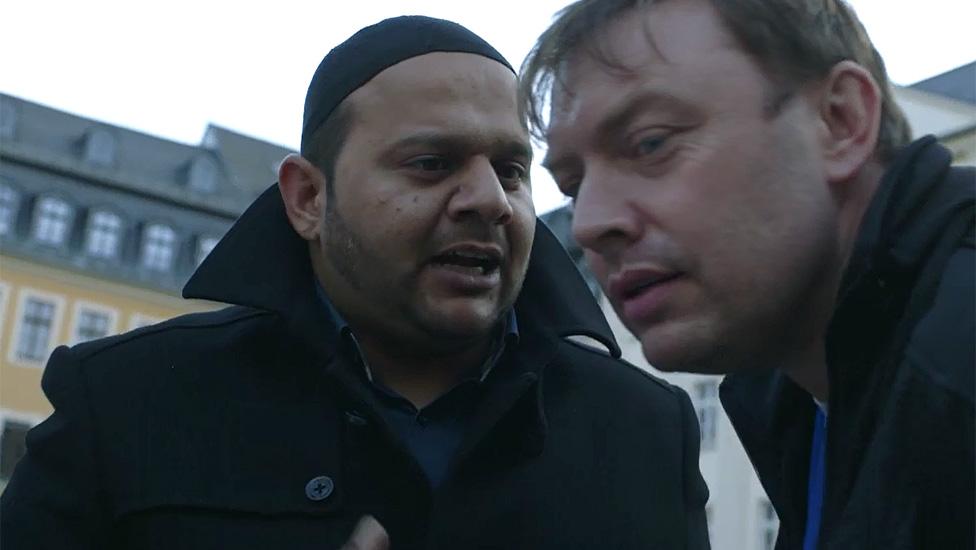
Dirk finds out more about Islam
When I return to Gera in early December, this is a message the city's new Muslims feel they have to push even harder.
The recent attacks in Paris are on everyone's mind - particularly since at least two of the attackers entered Europe posing as refugees. New arrivals in Germany tell me they worry that Germans will come to fear all refugees and that everyone will end up too scared even to communicate, resulting in a segregated city.
"I do believe that the opinion of many people has now changed, because many are afraid now that terrorists will mix themselves among the refugees," says Daniella. "Who knows who is a terrorist and who is a refugee? They don't have it written on their forehead."
They tell me of other concerns, too. There has been debate for months about lowering the minimum wage in Germany for refugees. It is a controversial idea that, as Dirk puts it, "will keep the big bosses happy", but he fears may lower wages for Germans.
Jobs are on everyone's minds here. I spend some time at a German language school. Classes are growing every day because of the arrival of refugees. I meet a language teacher who, though enthusiastic about the potential of the refugees, is not hopeful about their chances.
Sandy Mazur tells me that German is being taught, funded by the government, to a basic level - but after that the money stops.
"These refugees who come from Syria are very ambitious," she says. "They want work - and here in Germany we have so many free work places because we don't have so many young people."
But she says the German provided is not enough to get a job, and certainly not a job in anywhere near in the same professions the refugees worked in back home. Some are teachers, IT professionals and engineers.
As I leave in early December refugees are more visible on the streets of Gera.
Residents are undoubtedly nervous, but many of their foreign neighbours hope they can bring new life to this quiet city.
Catrin Nye's Our World report Welcome to Germany can be seen on the BBC News Channel and BBC World News (click for transmission times). Readers in the UK can watch it after 04:30 GMT on Saturday on the BBC iPlayer.